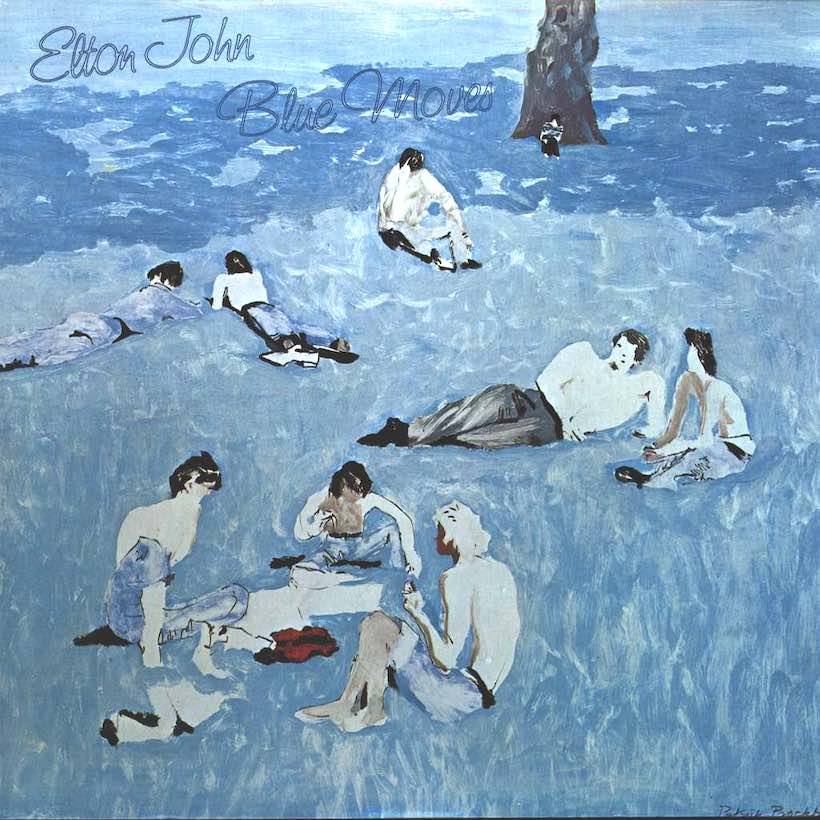By the autumn of 1976, Elton John’s astonishing productivity was yielding his 11th studio album in about seven years. That regime is all the more notable when you add in the endless touring undertaken by the singer-songwriter and his band on an increasingly worldwide basis. Now came an album that many fans still revere as something of a hidden gem in his repertoire, and which remains one of the artist’s own favorites.
The double LP Blue Moves, produced as usual by Gus Dudgeon, was new in stores on October 22, 1976 as Elton’s first release on his own Rocket label. In a punishing schedule in which he and lyricist Bernie Taupin completed another 18 songs for the release, the band were on the road before the album’s release on the summer tour called Louder Than Concorde But Not Quite As Pretty.
Then John made the announcement that, for now at least, he felt there was more to his career, and to life, than such relentless touring. Thus began a period that featured far less road work, a decision which perhaps impacted on the success of Blue Moves. To some, it’s remembered mainly for its enduring ballad and first single “Sorry Seems To Be The Hardest Word,” but devotees know it as a record absolutely full of lesser-known John-Taupin gems.
Paul Buckmaster and James Newton Howard each oversaw some stunning orchestrations, with the latter arranging the stirringly emotional, slow-building “Tonight.” Newton Howard also arranged the accordion and strings on “Sorry Seems To Be…” and the Gene Page Strings for an early excursion onto the disco floor, on the near-seven-minute “Bite Your Lip (Get Up And Dance).” That became a single, as did the splendid “Crazy Water.”
Listen too for the admirably laid-back “Idol,” the delicate “Cage The Songbird,” and ”If There’s A God In Heaven (What’s He Waiting For?).” The last two had co-writing credits (among a total of five) for guitarist Davey Johnstone. Other A-list musicians taking part included the Brecker Brothers, David Sanborn, and vocalists such as Graham Nash, Bruce Johnston, and Toni Tennille.
‘I’d rather they simply listen’
Blue Moves reached No.3 in both the U.K. and U.S., going gold in the first territory and platinum in the second, and was a Top 10 record in many other countries. Taupin agreed that the album had a more downbeat mood than its 1975 predecessor Rock Of The Westies. He told Circus magazine: “People are going to read a lot into Blue Moves: ‘Who’s this about, what made Bernie write this, what put Elton into this frame of mind?’ I don’t mind people interpreting, but I’d rather that they simply listen and enjoy.”
Listen to the best of Elton John on Apple Music and Spotify.
The album’s completion also brought about a brief hiatus in the John-Taupin working relationship, as Elton eased off his touring commitments for a time and explored a collaboration with lyricist Gary Osborne on 1978’s A Single Man. As Taupin later told Music Connection: “I think the Blue Moves album is really one of our most underrated records…because it was really an exercise in saying, ‘Here it is, this is us, and this could be it,’ and it could have been it. After the Blue Moves album, I had to get away because I think we were all killing ourselves.”
Buy or stream Blue Moves.



